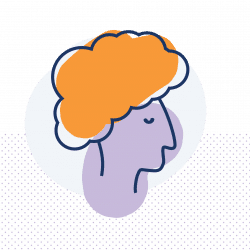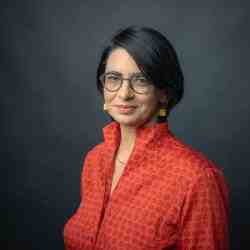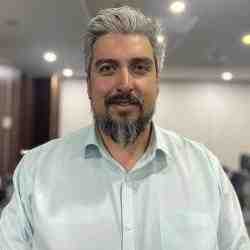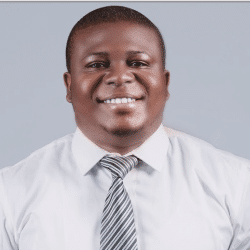Introduction
Darryl Holliday is building a new model for participatory journalism that convenes, trains and pays community members to become civic changemakers. The work, which has scaled to areas like Detroit and even Sao Paolo, Brazil, is breaking down barriers to access and is equipping people and communities who have historically been marginalized to take ownership of the way information is communicated and shared.
The New Idea
People need information about the communities they live in. To navigate their lives, they need to know everything from bus schedules to local laws and ordinances and what is happening politically in the community. To become active participants in civic changemaking, they need to know who their elected and appointed officials are, who is running for office, and what changes those people are considering and implementing. Over time we’ve entrusted much of this work of collecting and sharing information that helps us navigate our lives to newspapers and journalists. That sector is currently in crisis and has for even longer struggled to give community members meaningful ownership over (or equity in) what is being produced. Darryl Holliday is building a new model for “information equity” using participatory resources that respond to the needs of communities and equip them with the tools they need to make civic change.
In stark contrast to current media companies that focus on garnering clicks and views at the expense of marginalized communities, Darryl and his team at City Bureau champion an approach that serves these communities, in part because the people building and fueling it are community members themselves with ownership (i.e. “equity”) of the useful information that is shared by, for, and about them. In this process, new roles are created that allow more people to get involved in the production of the information they want and need. This shift in goals and roles breaks down barriers to access by equipping community members to share diverse perspectives and new information that build community rather than extract from it. This shift also equips people and communities who have historically been marginalized to take ownership of the way information is communicated and shared.
While this is not just about journalism, Darryl is reshaping journalism in part by training new and emerging journalists from diverse backgrounds to think differently about their work and to have the skills to bring their perspectives to the competitive marketplace of traditional media. City Bureau additionally works to connect communities with newsrooms through innovative workshops that build meaningful relationships and provide knowledge in accessible ways. Finally, Darryl is creating new roles through the Documenters program, which trains and pays community members to get involved in local journalism and civic life, and to create and share information in new ways. Documenters play a critical role: they hold city government accountable by attending and documenting public meetings while also helping produce new forms of news media that share this information in accessible ways for other changemakers who want to get involved. These three strategies feed into each other to create an ecosystem designed to promote both information equity and community changemaking.
People in the new Documenters role are community members who want to get active in changemaking within their cities but have not been given on-ramps or meaningful access to do so. City Bureau helps them access a pathway to democratize information and rebuild decentralized systems of information-sharing, no longer dominated by the privileged voices who dominate the field of journalism. Any aspiring changemaker can take up this new role and become key to their community’s understanding of information and therefore the whole community’s changemaking power.
The Problem
Lack of access to useful public information is a pervasive problem in under-resourced communities, though it is often not recognized as such. Darryl defines information equity as “the fair creation and distribution of information such that one’s identity does not determine their outcomes.” Information deprivation weakens democracy and grows a mistrust of institutions, including news media. We see this in the lack of holistic narratives that allow for a deeper understanding of separated and segregated communities. In this COVID moment, we see it in the proliferation of misinformation surrounding the coronavirus itself as well as the recent protests against police brutality. We see information inequity particularly in Black and brown communities that are hardest hit by the health and financial impacts of coronavirus, as well as being hardest hit by police violence itself. This problem persists in part because newsrooms are disproportionately staffed by people who are more likely to be white, male, and more affluent than the communities they cover. It surfaces in “if it bleeds, it leads” journalism, where communities that are disproportionately subjected to violence are otherized and demonized, as the violence is covered, but the systemic problems that lead to violence, such as underfunded hospitals and schools, go increasingly unreported. And it surfaces in the absence of avenues for community members to become civically involved as they are deprived of the information they need to do so.
Currently, relatively little effort is made to humanize marginalized communities in journalism. Traditional newsrooms have been disinterested in building bridges between journalists and the communities they cover, creating an absence of meaningful connection between newsrooms and communities. Journalists are taught a model of objectivity that often doesn’t make space for nuanced discussion of the underlying systems that create the social problems they report on, or for community members who are impacted by these problems to get involved in journalism. Darryl rejects the idea that one needs to leave one’s identity behind to be an “objective” journalist and actively welcomes new voices, creating the new models that allow them to thrive.
Existing models for journalism are crumbling, partly as a result of financial constraints as advertising-based models become unsustainable, particularly for local newsrooms, but also because the communities they are meant to serve are not having their needs met. A 2018 study of 900 Chicagoans conducted by City Bureau and the Center for Media Engagement found that communities of color in Chicago are significantly more likely to feel poorly represented in local media, less likely to have met a journalist and more likely to think journalists quote the wrong people in news media about their communities. However, despite feeling poorly represented by local media, these same people were more likely to volunteer their time to work with local media organizations. Darryl is building participatory community-focused and community-serving models to flourish in the places where gatekeeping, discriminating, and failing models once stood.
Communities should be able to rely on news media to inform and empower them, particularly on issues like government corruption and abuse of civic power. Citizens need avenues to learn about and engage with local government and respond to the decisions it makes. As the traditional journalism landscape, particularly the local news landscape, is severely struggling as a result of the failure of ad revenue-based models for sustainability and profit, the time is ripe for something new to grow up in its place, something that engages, empowers, and equips communities to make meaningful change. City Bureau, along with a growing number of new media organizations, is bringing that change and spreading that new model.
The Strategy
As part of its commitment to empowering community changemakers through democratizing information, City Bureau envisions and builds a new paradigm for journalism, one that prioritizes the communities it serves over ad revenue and clicks, and one that welcomes journalists from diverse backgrounds to bring their full selves to the work of journalism. Within and outside of journalism, Darryl is building a system that equips changemakers who want to hold their local governments accountable and protect and care for their own communities.
City Bureau uses a three-pronged strategy to create community-powered and community-empowering journalism, as well as equitable vehicles for information sharing and communication. First, their Civic Reporting Fellowship train journalists and aspiring journalists from diverse backgrounds to operate within the new community-focused paradigm and build careers in the competitive journalism marketplace. Journalism has a significant diversity problem, with newsrooms skewing white, male, and affluent compared to the communities they serve. The Civic Reporting Fellowship levels the playing field and seeds the ideas of community-powered journalism into people who will then go on to operate in more and more newsrooms and media outlets.
Secondly, City Bureau has built a space for mutual learning and building connections between newsrooms and the community. Called the Public Newsroom, these workshops, always free and open to the public, share knowledge on topics like mutual aid, tenants’ rights, utilizing the Freedom of Information Act, and how to center survivors in reporting of sexual violence. These workshops equip communities with information they need to protect, support, and care for each other, while informing the newsroom about community needs, and building trusting relationships between the newsroom and community members.
Third, City Bureau has built the Documenters Network, which pays and trains community members to attend, document, and report on local government meetings at the city and county-level, including board meetings, subcommittees and advisory councils. This builds a robust base of action civics and public accountability at the local level by engaging citizens who are eager to improve the place where they live but would benefit from on-ramps, support, and a network of other changemakers. The Documenters program promotes access to information that equips communities to make change, not just by training the Documenters as changemakers that access and interpret information for the public but by collecting the information and communicating it in accessible, useful, community-tailored ways. There have been 2,700 people who have joined the Documenters Network in Chicago, Cleveland and Detroit since its launch in 2015, and at any given time about 150 are applying for or conducting assignments. This gives community members marketable skills for a range of career paths and helps communities hold local government accountable.
These programs feed into one another. People who start out as Documenters can go on to become journalists through the Civic Reporting Fellowship, and Documenters work closely with Civic Reporting Fellows to build journalism products that will inform communities and support them in meeting their needs. City Bureau knows what those needs are as a result of listening closely at Public Newsroom events and bringing in community members themselves as Documenters and Civic Reporting Fellows. These programs work together to build a community-based approach to journalism that is more equitable and sustainable than existing models, and one that has supporting community changemakers as an explicit goal.
The City Bureau model, particularly the Documenters and Public Newsroom programs, has been replicated in Cleveland, Akron, Detroit, Fresno, Mississippi and Sao Paulo, Brazil, and Darryl is working to support other communities in replication across the country. In terms of impact metrics, Darryl and his team track the number of people engaged through their programs and are in the early stages of tracking the ways in which participants are changed by the process besides the significant evidence for more civic participation created by providing new avenues for this participation. City Bureau reaches people who are not reached by other programs, who have the desire to become changemakers in their community but not the available on-ramps to do so. Their Chicago program reached more than a thousand people in 2019 alone, a number which has grown significantly over time and continues to grow today. Overall, there are thousands more Documenters in other cities through programs inspired and trained by City Bureau. Their Chicago-based program also tracks the diversity of their participants through measures such as zip codes, proving conclusively that their program reaches people where they live and reflects the diversity of Chicago
City Bureau had a $1.1 million dollar budget in 2019. This includes a portion of a three-year grant from the American Journalism Project designed to help them build their long-term financial sustainability. Currently, their budget comes from foundation grants (including the MacArthur foundation), corporate and individual contributions, and revenue earned through consulting with other organizations on how to spread their model. In February 2021, City Bureau received a $1.5 million dollar grant from the Knight Foundation for its work in community-powered journalism.
The Person
Darryl grew up traveling around the country and world with his mother, who was in the military. Darryl would be raised across ten US states and Germany. He was always passionate about the arts and as a child would sell his creations in Central Park in the summers when he lived with his father. He initially studied English and Sociology in college but pivoted to journalism.
He was hired by a small Chicago media outlet in 2011 as a “crime and mayhem” reporter. He was assigned to cover shootings and stabbings, but he found that “objective” reporting on those instances of violence demonized the communities he was assigned to cover. This news model often discouraged a focus on their strengths or highlight the issues that led to poverty and violence, like school and health clinic closures and redlining. He found this model of journalism to be exploitative and extractive.
In 2012, while working as a reporter, he co-founded The Illustrated Press, one of the first initiatives to bring drawing and graphic art to news media. For example, when reporting on weddings taking place with people incarcerated in Cook County Jail, he was unable to bring photographers due to jail policy, but visual artists were able to visually document and provide a humanizing lens. He connected artists with journalists to add that visual element and create graphic-novel style journalism to help people connect with crucial stories. That genre has since taken off, but in the early days he had difficulty getting these stories accepted by news outlets. He left his reporting position in 2015 to work as a producer at the Invisible Institute, a media production organization focused on police accountability and, later, to co-found City Bureau.



